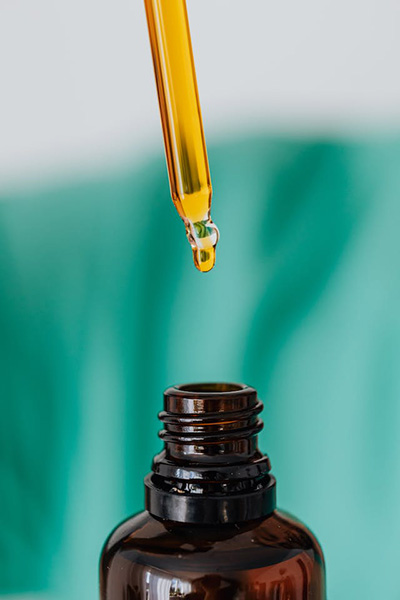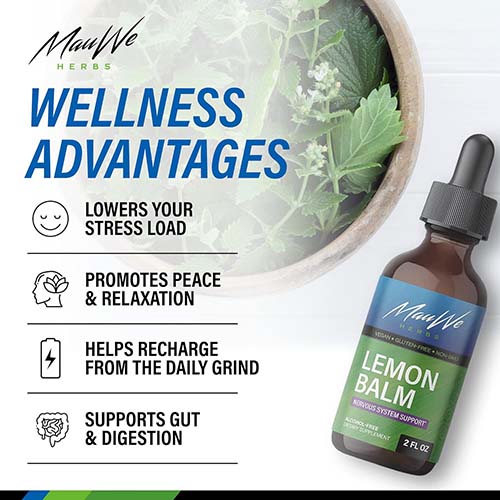Contents
- 1 Botanical Description of the Lemon Balm Plant
- 2 Extraction Process of the Essential Oil
- 3 Essential Components and Their Properties
- 4 Top Health Benefits and Uses of Lemon Balm Essential Oil
- 5 Scientific Research and Studies
- 6 How to Use Lemon Balm Essential Oil
- 7 Dosage and Concentration Tips
- 8 Buyer’s Guide: Selecting the Right Lemon Balm Essential Oil Product
Welcome to lemon balm essential oil, a natural elixir with a rich history and myriad benefits waiting to be explored. Often overshadowed by more common herbal remedies, this oil, extracted from the Melissa officinalis plant, is a hidden gem in natural healing.
Imagine a single, fragrant solution that can calm your nerves, sharpen your memory, and even protect your heart. That’s lemon balm essential oil for you! Its journey from a humble garden plant to a potent essential oil is a testament to nature’s power to support our health.
Botanical Description of the Lemon Balm Plant

Lemon balm is more than just a plant with a refreshing lemon scent. It’s a perennial herb from the mint family, known for its small, heart-shaped leaves and delicate, white flowers. This plant, often found in kitchen gardens and herbal patches, is not just a feast for the eyes but a powerhouse of therapeutic properties.
The beauty of lemon balm lies in its versatility. Traditionally, it has been a staple in culinary and medicinal practices, celebrated for its soothing effects and pleasant aroma. When we talk about Lemon Balm, we’re embracing centuries of herbal wisdom, where nature meets health most harmoniously.
Extraction Process of the Essential Oil
Extracting the essence of lemon balm is an art and science in itself. The process typically involves steam distillation, carefully drawing out the oil while preserving its beneficial properties. Picture this: fresh lemon balm leaves, harvested at their peak, are steamed to release their aromatic compounds. The lemon balm essential oil is the liquid form that results from the condensation of these fumes.
This extraction process is crucial as it ensures the oil retains its full spectrum of compounds, including its signature calming and therapeutic properties. It’s a meticulous process, but the result is a pure, potent oil that encapsulates the very soul of the lemon balm plant.
Essential Components and Their Properties
Let’s get to the heart of lemon balm essential oil – its composition. This oil is a complex blend of bioactive compounds, each contributing to its therapeutic profile. Important components like citronellal, geranial, and neral give it its characteristic lemony aroma, while other compounds like eugenol and rosmarinic acid add to its medicinal value.
These components work in synergy, making lemon balm essential oil a multifaceted remedy. From calming the mind to supporting the body’s natural healing processes, these compounds are the unsung heroes behind the oil’s efficacy.
Top Health Benefits and Uses of Lemon Balm Essential Oil
Reducing Anxiety and Stress: In the modern, hectic world, finding natural ways to alleviate stress and anxiety is more important than ever. Thanks to its calming properties, lemon balm essential oil emerges as a natural stress-buster. When inhaled, compounds in the oil interact with your brain to encourage relaxation and reduce feelings of anxiety. Relieving mental stress and providing a peaceful distance from the daily grind’s madness is like taking a deep breath.
Moreover, incorporating lemon balm essential oil into your routine can be simple yet transformative. A few drops in a diffuser may make your room smell like a calming perfume, perfect for unwinding and much-needed rest. It’s a natural, accessible solution for anyone seeking to bring a sense of calm to their day.
Cognitive Function and Memory Boost: Imagine an oil that not only calms your mind but also sharpens it. Lemon balm essential oil does just that. Its refreshing scent can stimulate your mind, enhancing cognitive functions and boosting memory. This makes it an excellent aid when you need mental clarity and focus.
Integrating this oil into your study or work routine can be incredibly beneficial. Students, professionals, and anybody else aiming to maximize cognitive function will find it an invaluable ally due to its ability to sustain mental alertness and boost attention.
Heart and Liver Protection: Lemon balm essential oil supports vital organs. Evidence shows that its components can help lower elevated triglycerides and improve cholesterol synthesis in the liver, contributing to cardiovascular health.
In addition, the oil’s antioxidant properties aid in protecting the liver, supporting its detoxification processes. Incorporating lemon balm essential oil into your health regimen can proactively safeguard your heart and liver health, offering a holistic approach to wellness.
Sleep Aid and Relaxation: Lemon balm essential oil could be your natural solution to sleep issues. Its calming effect on the mind and body makes it an excellent aid for inducing restful sleep. The oil creates an ideal environment for a peaceful night’s sleep by reducing stress and promoting relaxation.
You can use it in various ways to enhance your bedtime routine. For a more revitalizing night’s sleep, add a few drops to your pillow, place it in a diffuser beside your bedside, or mix it with a carrier oil for a pre-bed massage.
Cold Sores and Herpes Treatment
The essential oil of lemon balm has antiviral characteristics that make it helpful in treating herpes and cold sores. The oil can help reduce the severity and frequency of outbreaks, providing a natural alternative to conventional treatments.
Diluted lemon balm essential oil can soothe the skin and speed up recovery by being applied directly to the area. Its natural antiviral components combat the virus, offering relief and support during outbreaks.
Antioxidant Properties
To prevent oxidative stress, antioxidants neutralize free radicals. Lemon balm essential oil is rich in these beneficial compounds. Its antioxidant properties can help boost your body’s defense system, improving overall health.
Brain Cell Protection
Lemon balm essential oil is not just about soothing the mind; it also protects brain cells. Its neuroprotective properties can help maintain brain health, potentially offering benefits for conditions related to cognitive decline. Using lemon balm essential oil as a holistic approach to brain health can benefit people of all ages. It supports cognitive functions and helps preserve the health and vitality of brain cells.
Blood Pressure Regulation
High blood pressure is a common concern; lemon balm essential oil can be a natural ally in managing it. Its calming properties help relax blood vessels, improving blood pressure regulation.
Incorporating the oil into relaxation methods like yoga or meditation can maintain a healthy blood pressure level. It’s a natural approach to a healthy heart, aligning your body and mind for optimal health.
Scientific Research and Studies
The following findings validate traditional uses and open new avenues for its application in modern health practices.
Overview of Recent Studies and Their Findings

Recent scientific research has examined lemon balm essential oil, revealing fascinating insights into its health benefits. Studies have consistently shown that this oil possesses potent antioxidant, antimicrobial, and neuroprotective properties, making it a valuable addition to natural health remedies.
One notable study highlighted its effectiveness in reducing stress and anxiety. Participants reported significant improvement in mood and cognitive performance after using the oil, validating its traditional use as a mood enhancer and a mental clarity booster. This research paves the way for its broader acceptance in stress management and mental wellness.
Lemon Balm’s Role in Cancer Treatment
The potential of this oil in cancer treatment has been a groundbreaking area of research. Studies have discovered that certain compounds in the oil, such as eugenol and rosmarinic acid, have anti-cancer properties. Since these chemicals cause cancer cells to die through programmed cell death or apoptosis, there is optimism for new ways of treating brain and colon tumors.
Further research is ongoing to fully understand the oil’s scope in cancer treatment. While it’s not a standalone cure, its use as a complementary therapy shows promise, offering potential synergies with conventional treatments to enhance patient outcomes.
Comparative Analysis with Other Herbal Remedies
Researchers have been interested in comparing lemon balm with other herbal remedies. For instance, compared to lavender or chamomile, lemon balm essential oil exhibits similar calming effects but with added benefits like cognitive enhancement and antiviral properties. As a result of this comparative research, we can learn more about the potential uses of lemon balm in holistic treatments and regular wellness programs.
How to Use Lemon Balm Essential Oil
The following will guide you through various application methods to ensure you reap the maximum benefits.
Methods of Application: Topical, Inhalation, etc. Lemon balm essential oil has a variety of applications, each meeting a unique need. The two most typical ways are to apply it topically or breathe it in.
To make it suitable for topical use, add a little carrier oil (almond, coconut, etc.) to dilute it. This concoction can be a calming massage to relieve skin irritations and promote health. The key is to start with a low concentration and increase as needed, ensuring your skin comfortably accepts the oil without any adverse reactions.
Inhalation is another effective way to use the essential oil. One method is to put a few drops into a basin of boiling water and inhale the vapor. Another option is to use a diffuser, which disperses the oil throughout the air. Inhalation is particularly beneficial for reaping the oil’s calming and mood-enhancing properties.
Blending with Other Essential Oils: Lemon balm blends well with other essential oils. Combining it with lavender or chamomile enhances its stress-relieving and sleep-inducing effects. Mixing it with peppermint or rosemary can be effective for a boost in alertness and cognitive function.
The art of blending essential oils is about enhancing therapeutic benefits and creating unique aromas that appeal to the senses. Experimenting with different blends can be a delightful and rewarding experience, allowing you to tailor the benefits to your needs.
Dosage and Concentration Tips
Getting the dosage and concentration right is crucial for using lemon balm essential oil safely and effectively. For topical applications, a general guideline is to use a 1-2% dilution, which translates to adding one or two drops of essential oil for every teaspoon of carrier oil.
For inhalation, 3-5 drops in a diffuser are typically sufficient to fill a room with its soothing aroma. However, it’s essential to start with a lower amount and adjust according to your preference and sensitivity. Remember, a little goes a long way with essential oils, and it’s always best to err on caution.
Buyer’s Guide: Selecting the Right Lemon Balm Essential Oil Product
Selecting a high-quality product can be daunting, but our buyer’s guide can show you the ropes.
Purity of the Essential Oil
The purity of the lemon balm essential oil is paramount. Pure oil means it’s free from additives, fillers, or synthetic substances, which can dilute the product’s efficacy and safety. Always check the label for 100% pure essential oil indications, often denoted as “therapeutic grade.”
To verify purity, you can also look for the oil’s botanical name, Melissa officinalis, on the label. This ensures you get a genuine product derived from the lemon balm plant. Remember, impure oils reduce the therapeutic benefits and pose risks, primarily if used topically or inhaled.
Concentration and Origin
The concentration of lemon balm essential oil can vary, so it’s necessary to choose a product that offers a potent yet safe level. High-quality oils are often more concentrated, providing more significant benefits when used in a smaller amount.
Additionally, consider the origin of the oil. Lemon balm grown in its native environment is likely of higher quality due to the ideal growing conditions. Look for information about the oil’s source on the packaging or the manufacturer’s website. Oils sourced from reputable locations often guarantee better quality and purity.
Recommendations for Reputable Brands
You can’t buy any essential oil from any old brand. It’s wise to invest in products from reputable brands known for their commitment to quality and safety. Research online reviews read customer testimonials, and look for certifications or awards that indicate a brand’s credibility.
Moreover, brands that are transparent about their sourcing, manufacturing processes, and quality testing are typically more reliable. They may provide batch-specific GC/MS reports, which are tests that show the oil’s chemical composition, ensuring you’re getting a product that’s pure, potent, and safe.
Myths Debunked About Lemon Balm Essential Oil
Myth 1: Lemon Balm Essential Oil is a cure-all remedy.
While lemon balm essential oil has many benefits, it’s not a cure-all. It’s important to have realistic expectations and understand that while it can support health and wellness, it’s not a substitute for medical treatment.
It’s best used as part of a holistic approach to health, complementing other healthy practices and treatments. Never self-medicate with lemon balm essential oil; on the contrary, if you are seriously ill, you should consult a doctor.
Myth 2: More oil equals better results.
A common misconception is that using more lemon balm essential oil will lead to better or faster results. However, when it comes to essential oils, less is often more. Excessive use may cause skin irritation or hypersensitivity, among other side effects.
Adhere to recommended dilutions and dosages. Essential oils are potent, and a small amount can provide significant benefits. Always use them mindfully and in moderation for the safest and most effective results.
Health Disclaimer: The information on this website is for educational uses only and is not a substitute for professional medical advice. Always consult an authorized healthcare provider for any health concerns before using any herbal or natural remedy. We do not establish, treat, cure, or prevent any disease. Reliance on any material from this website is solely at your own risk. We are not responsible for any adverse effects resulting from the use of information or products mentioned on this website.
REFERENCES
- Herb Society of America – Lemon Balm: https://www.herbsociety.org/file_download/inline/d7d790e9-c19e-4a40-93b0-8f4b45a644f1
- Nature In Bottle – Melissa Essential Oil Organic: https://www.natureinbottle.com/product/melissa_lemon_balm_essential_oil

